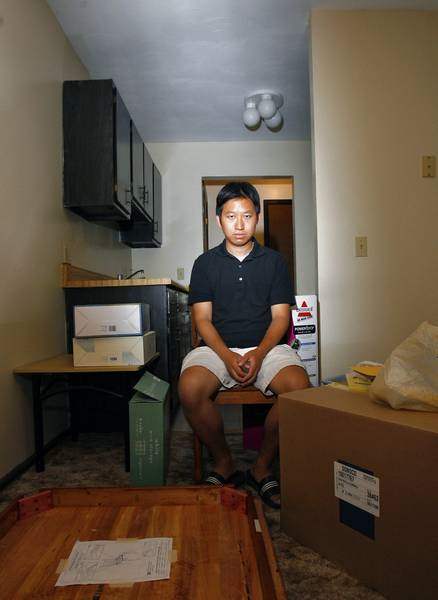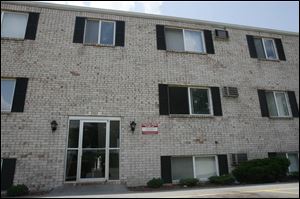
Tenant's plea of 'release me' often denied
7/2/2006
Hien Huynh, traumatized by a murder-suicide, has decided to leave despite two months remaining on his lease.

Hien Huynh, traumatized by a murder-suicide, has decided to leave despite two months remaining on his lease.
Medical student Hien Huynh is haunted by the tragedy that unfolded just outside the doorstep of his south Toledo apartment in the predawn hours of June 3.
Angry voices.
Screams of "Help!" "Help!"
Gunfire.
Then, a pretty young college marketing major lay crumpled in the hallway not far from an apartment where her assailant and longtime sweetheart was mortally wounded from a self-inflicted gunshot.
Eager to distance himself from the murder-suicide, Mr. Huynh (pronounced win) began making plans to move. Not so fast, replied managers of Arlington South Apartments.
While expressing empathy, they reminded the 23-year-old second-year student at the University of Toledo medical school that he has two months remaining on his lease.
The incident underscores the conflict that can arise when tenants seek to breach leases because of personal health issues, job transfers, safety concerns, or other extraordinary events.

Michelle Mielecki was killed at this south Toledo complex by her boyfriend, Andrew Brown, who then took his own life.
In general, legal experts say, tenants can be liable for remaining rent payments unless the circumstances are specifically addressed in lease documents or the apartment is uninhabitable because of disrepair or unsafe conditions.
There are exceptions, said lawyer Doug Wilkins, who represents many Toledo area landlords.
Those include tenants called to active military duty. Likewise, someone recuperating from a heart attack or serious surgery probably could make a good case for being allowed to leave a complex filled with boisterous college students, he added.
Like other lawyers interviewed, Mr. Wilkins declined to comment specifically on the situation at Arlington South Apartments, on Arlington Avenue near Byrne Road.
He noted that judges apply the law differently, especially requirements that landlords maintain safe conditions. He is aware of cases in which tenants have been allowed out of a lease by claiming they experienced emotional trauma from living conditions.
Of course, most disputes are settled before trial.
In some situations, apartment owners let tenants out of leases for "public relations" reasons after high-profile tragedies. "If only a few people are asking, sometimes it's a good business decision to let them out," he said.
"But if you have a high vacancy rate and feel you have taken significant safeguards, and there is language in the lease, there is reason to oppose it."
Four tenants at Arlington South Apartments asked to leave after the deaths of Michelle Mielecki and Andrew Brown, according to Heather Warren, a manager. The victim and her assailant were both 21-year-old students at UT's main campus. Only Mr. Brown's roommate in Unit 58 was released from his lease.
"If we let one out, every single resident will want out," Ms. Warren said of the other requests.
"I understand the situation was horrible," she added. "But these are things that myself and any other owner cannot stop. Things we can stop are drugs, gangs, and things of that nature. We're not in control of domestic disputes."
Dennis Noneman, who manges 1,000 apartment units in the Toledo area, said Arlington South owners are not obligated to release tenants from leases.
"It isn't like there was a murder there and the perpetrator is still on the loose," said the owner of Noneman Realty, who formerly managed Arlington South. It is owned by Michigan-based Lorain Point Apartments LLC.
His firm typically takes a hard line on tenants who breach leases. Mr. Noneman regards leases as binding contracts like mortgages. Yet tenants often have the notion that a job transfer or purchase of a home is grounds for walking away, he explained.
Not so, he said. His firm typically demands three months rent to void a lease.
The law requires tenants to cover payments under the lease only until a new tenant is found, and stipulates that landlords must make a serious effort to fill the apartment.
In job transfers, Mr. Noneman said, the new employer often pays off the person's lease along with moving costs and other expenses.
Even in situations where a tenant recovering from an illness is bothered by noise, he or she has a duty to give the landlord 30 days to fix the problem, the rental executive added.
But Mr. Huynh, who lives in Unit 57 across from Mr. Brown's former apartment on the third floor, regards the position taken by Arlington South as "cold and heartless."
He had only a nodding acquaintance with Mr. Brown. On the morning of the murder, Mr. Huynh and several other tenants called police in response to the young woman's cries for help.
Without a weapon, he was uncertain what he could do against a man with a gun.
After police arrived, he emerged from his apartment to a scene of devastation: bullet holes, blood, and the body.
He was traumatized by the incident and decided he could not stay there. He found another place and began sleeping at a friend's home until it was ready.
The medical student, who grew up in the suburbs of Washington, has been told by apartment managers that they intend to hold him to terms of the lease. They have advised him that failure to pay could adversely affect his credit rating.
He is leaving the apartment anyway.
Susan Choe, supervising attorney at a Student Housing Legal Clinic at Ohio State University, frequently counsels students who want to void leases, although the circumstances are rarely as unusual as at the Toledo apartment complex.
In situations where students must leave for health reasons, landlords usually have been willing to release them from rental contracts, Ms. Choe said.
She advises student-clients to insist that leases provide for certain contingencies, such as the possibility that the student will move to take a job or that he or she will decide not to stay at school for summer sessions.
"A tenant is free to terminate at any time," Ms. Choe continued.
"But if they terminate and there is a remaining term on the lease itself, they could be held responsible for the remainder of the rental obligation."
Contact Gary Pakulski at: gpakulski@theblade.com or 419-724-6082.